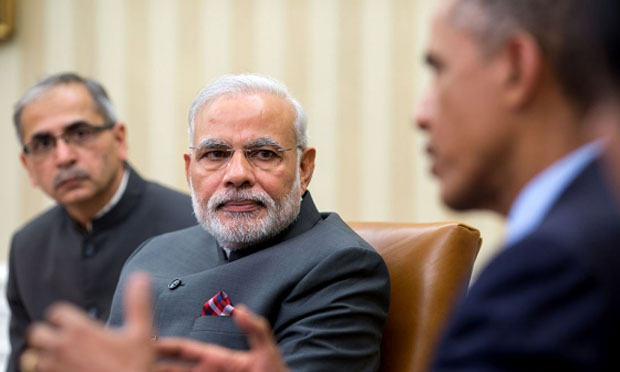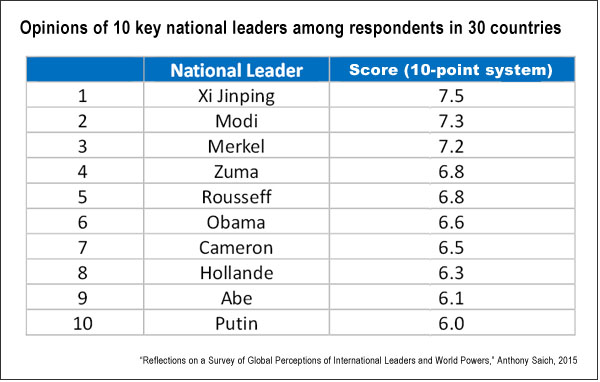Nations have deeply subjective ideas about each another, and the images they project to the world are filtered through complex cultural, economic, political and security perspectives. Perceptions of current presidents and prime ministers heavily influence how the global public evaluates countries, as do the way leaders’ images are refracted through news media. Nowhere are these dynamics more evident than with the differing views of the world’s two leading economic powers, the United States and China, as suggested by Pew Research Center data.
A December 2014 working paper from the Harvard Kennedy School, “Reflections on a Survey of Global Perceptions of International Leaders and World Powers,” looks at how the world’s major leaders are seen by domestic audiences and abroad. The researcher, Anthony Saich of Harvard’s Ash Center for Democratic Governance and Innovation, sought to better understand the relationship between political institutions and citizen awareness of political leaders. The survey — which involved 26,000 respondents across five continents — asked citizens from 30 countries for their views on 10 influential national leaders with power on a global scale.
Saich notes that the data reveal two key trends: First, responses are heavily influenced by geopolitics and existing conflicts and contacts between countries; second, there was a correlation between the nature of the political system and citizens’ opinions of their own nation’s leader. Multi-party systems or two-party systems are generally more critical of their leaders compared to systems where politics is less contested.
The study’s other findings include:
- When all respondents were asked about political leaders, the highest average rates of awareness were for U.S. president Barack Obama (93.9%) and Russia’s president, Vladimir Putin (79.3%). China’s president Xi Jinping’s recognition rate was 59%.
- The leaders with the lowest global awareness ratings were Brazil’s president, Dilma Rousseff (25.4%), and South Africa’s president, Jacob Zuma (27.8%). Neither was seen by survey respondents in playing a strong role on the international stage.
- In countries where the government dominates the media, citizens in general say they pay more attention to their leaders. The survey found that 93.9% of Chinese respondents say they pay attention to President Xi, while Zuma and Putin received the attention of 92.5% of their countries’ citizens. Only 74.4% of U.S. respondents say they pay attention to President Obama, while the percentages for leaders of Western European countries was even lower.
- When citizens were asked which leaders outside of their own country they pay the most attention to, Obama, Putin and Xi rank at the top. Xi ranks highest for those in Asia and Africa, where over 80% of citizens surveyed stated they pay attention to him. Putin is most closely followed in the United Kingdom, China, Vietnam, the United States, Egypt and Finland.
- Leaders of countries where discussion of politics is controlled, such as China, tend to be viewed more favorably by their own populations. In countries with a more open press, leaders receive lower ratings their citizens, such as in the United States.
- The average ranking across the 30 countries for Putin was the lowest of all leaders surveyed (6 out of a possible 10), while Xi obtained the highest rating (7.5). With the exception of Japan, Xi is reasonably well received in all countries in the survey. Obama is at sixth place (6.6), while Chancellor Angela Merkel of Germany ranked third (7.2).
- Jacob Zuma received low rankings his country’s citizens, with a rating of 12.8% for confidence in his handling of domestic affairs and 18% for international affairs. Xi gets the best domestic ratings, with 94.8% and 93.8% for the same two categories.
- Four leaders enjoy high levels of confidence among their citizens in their handling of domestic and international affairs: Xi, Putin, Indian prime minister Narendra Modi, and Merkel. The survey indicates that Rousseff, President François Hollande of France, and Zuma don’t enjoy confidence in their handling of either domestic or international affairs.
- “In terms of overall assessment, Chancellor Merkel rated first for confidence in her handling of domestic affairs (79.7%), President Xi ranked second at 78.5%, Obama fifth (64.5%), Putin seventh (60.2%), and [Japan’s Prime Minister Shinzō] Abe worst (42.5%).”
- The survey found a relationship between a presidential visit and respondent awareness. Appreciation for Xi’s domestic and international policies rises 10% for those countries he has visited, as does awareness if he visited a country. “This would seem to argue for the value of state visits,” Saich notes.
India’s Narendra Modi saw high evaluations domestically, and his standing defies the general rule that leaders have lower evaluations in societies with a large number of political parties and political openness. However, Saich cautions that the survey was undertaken just after Modi had been elected.
Related research: A well-known and often-criticized tendency of news media and political actors is to “personalize” complex issues, reducing them to conflicts between leaders rather than highlighting the tensions between systems or institutions, or larger historical forces. For more on this phenomenon, see “Mediatization and Personalization of Politics in Italy and France: The Cases of Berlusconi and Sarkozy,” published in the International Journal of Press/Politics; “The Personalization of Politics in Western Democracies: Causes and Consequences on Leader–follower Relationships,” published in the Leadership Quarterly; and “Personalization of National Election Campaigns,” in Party Politics.
Keywords: international relations, United States, China, India, France, Germany



Expert Commentary